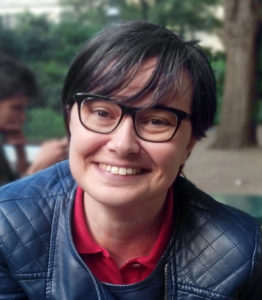 By Grazia De Michele, Researcher,
By Grazia De Michele, Researcher,
University of Genoa
Note: Grazia De Michele was diagnosed with breast cancer in 2010 and splits her time living in Italy and England. She has degrees in Political Science and Italian Studies. She is currently a Ph.D. student in History at the University of Genoa (Italy).
In a riveting 2009 TED talk Nigerian novelist Chimamanda Ngozi Adichie warns against what she refers to as the danger of a single story. Reducing reality to a monotonous narrative can make us miss the multifariousness and richness of our experiences and ultimately of the world we live in. This happens, Adichie explains, every time we expect African people to behave in accordance with our preconceived ideas about them and the continent they are from.
Adichie’s words resonated so much with me in the aftermath of my breast cancer diagnosis in 2010. Aged only 30 at that time, I found myself thrown into a vortex of mutilating, toxic and prolonged treatments with no guarantee of survival. The clash between my anger and despair and the upbeat attitude that I was expected to have, based on what’s typically recommended by the well-known European breast cancer organizations, resulted in a feeling of inadequacy that only the virtual encounter with U.S. breast cancer advocate AnneMarie Ciccarella would change. Following AnneMarie’s blog and tweets I found out that the breast cancer movement was much more complex than I thought. The big non-profits and their approach to breast cancer, symbolized by the ubiquitous pink ribbon, were only a part of the story. An equally important part was constituted by a small and feisty organization called Breast Cancer Action that in only two decades of history had managed to gather tens of thousands of members and claimed the role of watchdog of the breast cancer movement.
I started to read everything I could find about Breast Cancer Action, from their newsletter to the scholarly books and articles, mostly written by sociologists, analysing the particular kind of activism the organization embraces. The more I learned about Breast Cancer Action, the more questions I had: Why wasn’t there a similar group in Europe, where I lived? How did a handful of mostly metastatic women start the organization? How did Breast Cancer Action reach international prominence and when did that happen? Who were the early members and the members that came later? Were they all radical feminists or a more diverse group of people?
In December 2014, I had the chance to visit Breast Cancer Action’s office in San Francisco. I was warmly welcomed by the staff and executive director, Karuna Jaggar, who told me about some boxes containing old pictures and documents stored in their basement. My first thought was that those boxes could provide me with the answers to my questions. The second, that I desperately wanted to open them and that the chance to do so was wrapped up in going back to school to complete a second Ph.D.
On November 1, 2017, I officially started to work on my research project titled “The Bad Girls of Breast Cancer: A History of the Breast Cancer Organization Breast Cancer Action, 1990-2010” as part of a doctoral programme in History at the University of Genoa (Italy). The project will last 3 years and I’m looking forward to splitting my time between my home in Europe and in the U.S. as I conduct my research. My goal, when all is said and done, is to publish a book that dives into the history of Breast Cancer Action in order to add another, critically important, piece to the mosaic that makes up the history of the breast cancer movement. There’s real danger in simplifying the history of the movement to a single narrative. Making sure Breast Cancer Action is known internationally for their important role in the movement is an incredible responsibility, and one I’m honoured and excited to take on.
I welcome contributions from members and former staff. If you have memories, documents or pictures to share please contact me at: grazia.demichele@edu.unige.it